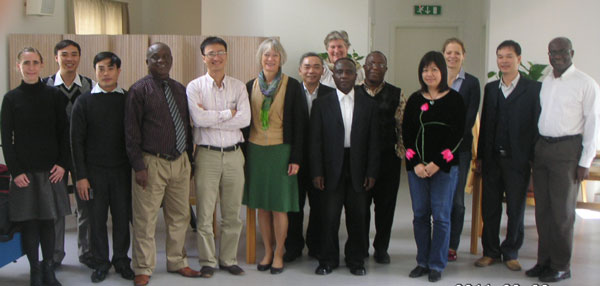Research Partnership Building
14-12-11
A Week in the Name of Research Partnership Building

By Pernille Friis, Research Project Administrator at DFC
From September 19th – 23rd 2011, researchers from Ghana and Vietnam visited Denmark to meet potential Danish research partners.
The week in Denmark is one of the many steps in the process of applying for a research project grant under the Pilot Research Cooperation Programme (PRCP).
The week’s programme was thoroughly prepared by DFC to ensure the best possible settings for the Ghanaian and Vietnamese researchers to meet in and select their future research partners.
Speed dating
Also the Danish research institutions had carefully planned the time available with the researchers from Ghana and Vietnam to demonstrate their research capacity and convince the visitors of their potential as future research partners.
You may call it “speed dating” as the time with each Danish research institution was very short.
“We were well received by the Danish researchers, but it would have been good to have more time with each Danish research institution,” was one of the comments at the feedback meeting at DFC. Something to look into for next year’s programme. In general, however, the researchers from Ghana and Vietnam were very pleased with the content of the week.
Fruitful week
“It has been a very good and fruitful week. The pre-meetings in the Ministry of Foreign Affairs and at DFC were very useful, and we managed to reach far in the discussions with the Danish researchers,” one of the researchers from Ghana stated.
In addition to the meetings with the Danish researchers, preparatory meetings were also held in the Ministry of Foreign Affairs and at DFC to introduce the researchers from Ghana and Vietnam to the PRCP and to give valuable advice on how to establish effective partnerships with the Danish research institutions.
Effective research partnerships are important, as the long-term cooperation is one of the main pillars of the PRCP.
One year application process
The PRCP application process started early 2011 with a Call for Concept Notes in Ghana and Vietnam. Following an initial screening and international peer reviewing of the concept notes, two concept notes from each of the two countries were recommended in June 2011 by the Consultative Research Committee for Development Research, an advisory committee under the Ministry of Foreign Affairs. The recommended concept notes were announced to Danish research institutions in order to express interest in the research cooperation before representatives from the applicant institutions visit Denmark to meet the Danish researchers.
With a success rate of about 10-15 per cent, the researchers from Ghana and Vietnam have already made it far in the application process. The researchers have about two months to prepare a fully-fledged project proposal with the selected Danish research partners.
Depending on final approval by the Ministry of Foreign Affairs, the researchers may start project activities in the beginning of 2012. The overall application process takes about one year.
More information on the PRCP is available at DFC website.
What is the Pilot Research Cooperation Programme?
In 2008, a demand driven approach to development research was introduced in two Danida partner countries, Vietnam and Tanzania, the so-called Pilot Research Cooperation Programme (PRCP).
In 2011 Ghana was selected as a new partner country for the PRCP. Vietnam entered into a second phase of the programme.
In the PRCP, institutions in the partner countries prepare the concepts of the research projects, and they are responsible for selecting relevant Danish research partners and take the lead in managing the projects.
The main objectives of the PRCP are strengthening the research capacity in the partner countries as well as strengthening the long-term cooperation between Danish institutions and institutions in the countries involved.
Facts: DFC and Development Research
The administration of the Ministry of Foreign Affairs’ support to developmental research and to research capacity building was outsourced to Danida Fellowship Centre in 2008.
Go back to our stories
